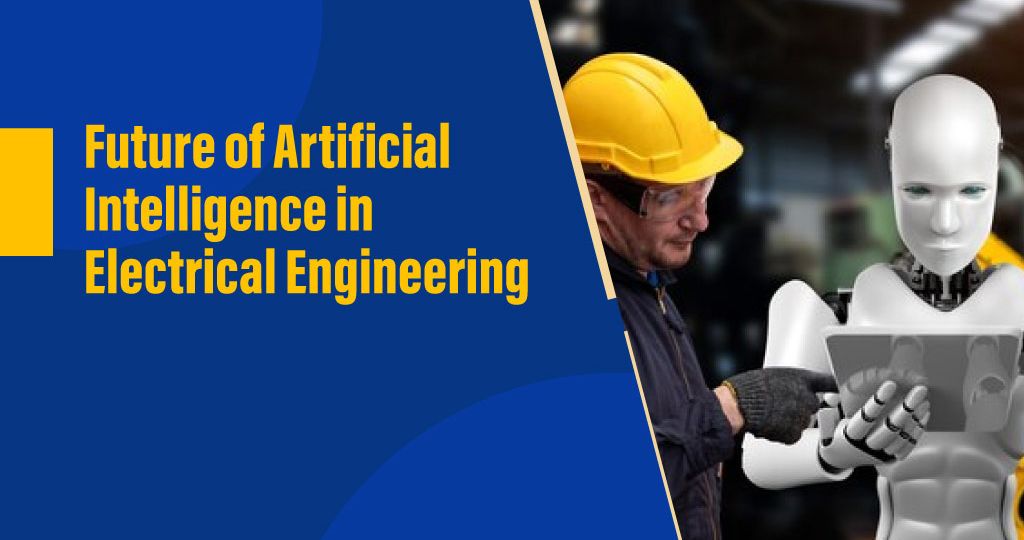
In today’s world, you might be aware that the field of electrical engineering is going through a transformative evolution that is led by the great influence of AI in electrical engineering. AI has a major role in holding space for creativity, efficiency, and sustainability and is also merging well with electrical systems, circuit design, and energy management.
This blog will assist you in investigating the multiple ways in which artificial intelligence is changing electrical engineering, as well as its main tools and potential expansion as these technologies advance in the future.
Major Impact of AI in Electrical Engineering:
The use of artificial intelligence in electrical engineering has created new opportunities for boosting system performance, energy usage, and reducing human involvement on complex tasks.
One of the prime examples is the future of smart grid technology, which depends majorly on AI to analyze energy demand and improve the distribution of energy resources. The AI-powered electrical systems of the future include autonomous energy management, fault detection, and adaptive systems that improve safety and sustainability.
What are the AI Application Tools in the Electrical Engineering Field?
A range of multiple AI tools and systems engineering frameworks have been developed specially to meet the demands of artificial intelligence and electrical engineering. You shall take a look at a few primary tools given below:
Simulink and MATLAB: Mostly used in AI and engineering, Simulink and MATLAB offer us simulation capabilities that are essential for neural networks in circuit design and developing intelligent control mechanisms.
TensorFlow and PyTorch: These machine learning libraries are necessary in machine learning in electrical engineering, enabling us to do tasks like predictive maintenance, anomaly detection, and process optimization.
SCADA Systems with AI Integration: Integrating AI into SCADA allows us to do real-time monitoring and predictive capabilities, improving power system resilience and efficiency.
List of Applications of AI in Electrical Engineering
The applications of artificial intelligence in electrical engineering span a wide range, from automation to energy management.
You shall find below a few applications of AI in electrical engineering:
1. Smart Grids:
Smart grids help us to manage energy distribution more efficiently, detect faults quickly, and optimize load balancing. The future of smart grid technology is intertwined with AI, as it helps us with data-driven decision-making for energy suppliers and ensures the grid’s stability.
2. Predictive Maintenance:
AI-powered predictive maintenance with AI uses machine learning algorithms to analyze data from electrical systems, which helps us predict when equipment will fail and schedule maintenance accordingly. This reduces our downtime, cuts maintenance costs, and ensures smoother operations.
3. Renewable Energy Management:
As renewable energy sources like wind and solar have become more common nowadays, AI helps manage their variability. AI in renewable energy management can predict energy production based on your weather patterns, optimizing the integration of these sources into the grid.
4. Control Systems:
AI-based intelligent control systems for electrical engineers like you enhance control mechanisms by processing large amounts of your data and automating responses to different conditions. This allows you to have more precise control over complex systems like industrial machinery, electrical grids, and transportation networks.
5. Energy Efficiency Optimization:
AI can analyze energy usage patterns to identify ways to reduce waste and enhance efficiency. AI for energy efficiency is particularly useful for EEE engineers like you in large-scale facilities like factories, hospitals, and campuses, where small efficiency improvements can lead to significant cost savings.
The Growing Impact of AI in Electrical Engineering
You must have been hearing a lot about how AI is making waves in electrical engineering.AI is transforming everything from power systems to automation.
Could you explain how AI is actually impacting the electrical engineering field?
The electrical engineering artificial intelligence fusion promises you various advancements in the following sectors:
Automated Decision-Making: AI enables full automation in making useful decisions, reducing human intervention and increasing efficiency.
AI and IoT Integration: AI with IoT allows real-time monitoring and adaptive, self-regulating electrical systems.
Energy Storage Optimization: AI optimizes charge cycles, crucial for renewable energy storage.
Safety and Security: AI detects anomalies in infrastructure, enhancing protection against cyberattacks and operational failures.
The future of artificial intelligence in electrical engineering holds immense innovation potential. As AI technologies continue to advance, their integration into electrical engineering will enable smarter, more efficient, and more resilient systems.
Conclusion
The integration of artificial intelligence in electrical engineering is shaping the future where systems are smarter, more efficient, and responsive. From automation in power systems to enhancing neural networks in circuit design, AI is transforming every corner of the field. By leveraging AI applications in electrical engineering, engineers can create intelligent, self-regulating systems that improve power reliability, enhance safety, and drive energy efficiency.
As new AI technologies emerge, electrical engineers, including those from B.Tech Artificial Intelligence colleges in Coimbatore, will continue to develop systems that not only meet today’s demands but also anticipate the needs of tomorrow.
